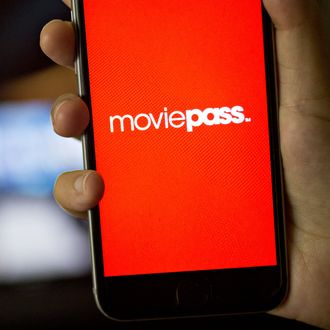
MoviePass is not dead yet. The beleaguered movie ticket subscription service, which burned through hundreds of millions of dollars last year and reportedly lost more than half of its subscribers, has purchased prime real estate on some Times Square billboards and is letting people know it is still in business. Along with the ad space, Business Insider reports that the company’s executive vice-president, Khalid Itum, posted a message to LinkedIn today that said:
“Proud to reveal our new ad campaign.
MoviePass should never have been controversial — but we all could come up with multiple reasons for why it was.
It’s time to put the past just there … and to pave the path forward.
MoviePass
Let’s go to the movies.”
As BI points out, the company has been making overtures toward big theater chains that it stepped on the toes of during the (brief) halcyon days of its existence last summer, chains like Regal and AMC. At the bottom of its Times Square billboard there is a map of Midtown Manhattan showing dots where theaters are located. In addition to angering cinemas, MoviePass also upset customers with price hikes and limitations as the business started getting shakier, and since the company’s decline, other subscription services have cropped up as competitors. Here’s to making better business decisions in 2019!
Update February 2: On the same day Moviepass unleased its billboard campaign, the company was hit with a class-action lawsuit. Lawrence and Laurie Weinberger of Sea Cliff, New York, accuse Moviepass of “deceptive and unfair bait-and-switch scheme.” The pair bought Moviepass at $105.35 in March 2018, with the understanding that they could see a movie every day of the year. After the new pricing model was unveiled, the Weinbergers were only able to see three movies in 10 months. “The New York case seeks to represent all customers who subscribed to MoviePass between February 2013 and August 2018,” Variety said. “The suit alleges claims of deceptive advertising and breach of contract.” Another class-action suit was filed against the company last year in San Francisco.

